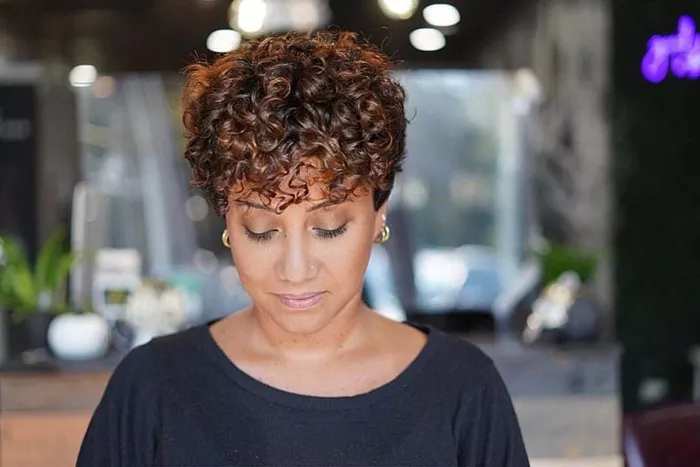Curly hair behaves differently than straight hair, and this is especially true for bangs. The natural texture of curls means they spring upward, shrink when dry, and often have a mind of their own. When cutting or styling curly bangs, you must account for this movement. Unlike straight bangs that fall neatly across the forehead, curly bangs form coils or waves that can either frame the face beautifully or create unwanted volume. The key lies in working with the curl pattern rather than against it.
Many people with curly bangs make the mistake of treating them like straight hair. They might blow-dry with a round brush to force the curls flat or use heavy products that weigh down the natural texture. This often leads to frizz, uneven shapes, or bangs that disappear into the rest of the hair when dry. The first rule of curly bangs is to embrace the curl. This means understanding your specific curl type (from loose waves to tight coils) and designing a styling routine that enhances its natural shape.
Preparation: The Foundation of Great Curly Bangs
Before reaching for styling tools, perfecting curly bangs starts in the shower. Use a sulfate-free cleanser to maintain natural oils that keep curls hydrated. When washing, gently massage the scalp around your bangs using fingertips—never nails—to prevent disrupting the curl formation. Apply conditioner specifically formulated for curly hair, focusing on mid-lengths to ends. For extra definition, try the “squish to condish” method: cup water in your hands and scrunch upward while rinsing to encourage clumping.
Towel-drying is a critical step most people get wrong. Never rub curly bangs with a regular towel—the friction causes frizz. Instead, use a microfiber towel or old cotton T-shirt to gently squeeze out moisture. Leave bangs slightly damp before styling; completely dry curls become resistant to product absorption. If you blow-dry, always use a diffuser attachment on low heat. Hold the diffuser at the roots and lift upward to maintain volume without disturbing the curl pattern.
The 7 Game-Changing Styling Techniques
Finger Coiling for Defined Curls
Apply a pea-sized amount of curl cream or gel to damp bangs. Take small sections and wrap each curl around your index finger from root to tip. Hold for 5 seconds to set the shape. This method creates uniform ringlets and trains curls to follow a consistent pattern.
The Pineapple Method for Overnight Care
Before bed, gather your bangs upward and secure loosely with a silk scrunchie at the crown. This prevents flattening while you sleep. Use a silk pillowcase to minimize friction. In the morning, simply shake out your bangs—they’ll maintain their bounce without restyling.
Strategic Trimming
Curly bangs require more frequent trims—every 6-8 weeks—to prevent triangular shaping. Always cut curly bangs when dry, as wet hair stretches and leads to over-shortening. Use shears to vertically “snip” into ends rather than cutting straight across. This removes bulk while preserving the natural shape.
Taming Flyaways with Hydration
Mix 1 drop of argan oil with water in your palms. Smooth over dry bangs to calm frizz without greasiness. For stubborn flyaways, wrap them around a small-barrel curling iron (1/4 inch) for 3 seconds—no clamping needed.
Creating Volume at Roots
Lift sections of damp bangs and spray a light-hold texturizing spray at the roots. Clip each section upward with duckbill clips while air-drying. The clips create lift exactly where needed without flattening surrounding curls.
The Half-Up Solution
On days when bangs feel overwhelming, gather just the front section into a tiny half-up style using decorative pins. This showcases your curls while keeping hair off your face. Pull out a few face-framing tendrils for softness.
Emergency Refresh Spray
Mix 1 cup filtered water with 1 tbsp leave-in conditioner in a spray bottle. Mist over dry bangs then scrunch. The curls revive without becoming crunchy or sticky. Add 2 drops of peppermint oil for a refreshing scalp treatment.
Product Selection: What Actually Works
Not all products suit curly bangs. Avoid heavy pomades or waxes that collapse delicate curl structures. Look for lightweight formulas with these key ingredients:
Glycerin: Draws moisture from the air to prevent dryness
Pectin: Creates flexible hold without stiffness
Jojoba oil: Mimics scalp’s natural sebum for shine
Hydrolyzed wheat protein: Strengthens fragile curl strands
A winning combo: Apply mousse to damp bangs for volume, follow with a curl-defining gel, then seal with an oil spray. Always apply products praying hands-style—smooth between palms then glide over hair—to maintain clumping.
Common Mistakes to Avoid
Over-brushing is the death of curly bangs. Once styled, never run a brush through dry curls—this causes instant frizz. If you must detangle, use a wide-tooth comb in the shower while conditioner is still in hair.
Another pitfall: cutting bangs too short. Curls shrink up to 30% as they dry. A good rule: cut bangs to bridge of nose when stretched—they’ll spring up to forehead length.
Lastly, avoid heat styling addiction. Constant flat ironing destroys curl memory. If you must straighten curly bangs occasionally, use a heat protectant spray and keep iron below 300°F (150°C).
Conclusion
Styling curly bangs isn’t about achieving perfection—it’s about enhancing what makes your hair unique. Some days your bangs might form perfect spirals; other days they’ll be wild and free. That’s the beauty of curls. With the right techniques and mindset, you can turn your curly bangs from a styling challenge into your signature look. Remember: when in doubt, add more moisture, touch less, and let those curls shine.
Related topics:
How To Style Bangs On Curly Hair
11 Styles For Curly Hair With Bangs
Exploring 3 Chic Korean Short Curly Hairstyles with Bangs


